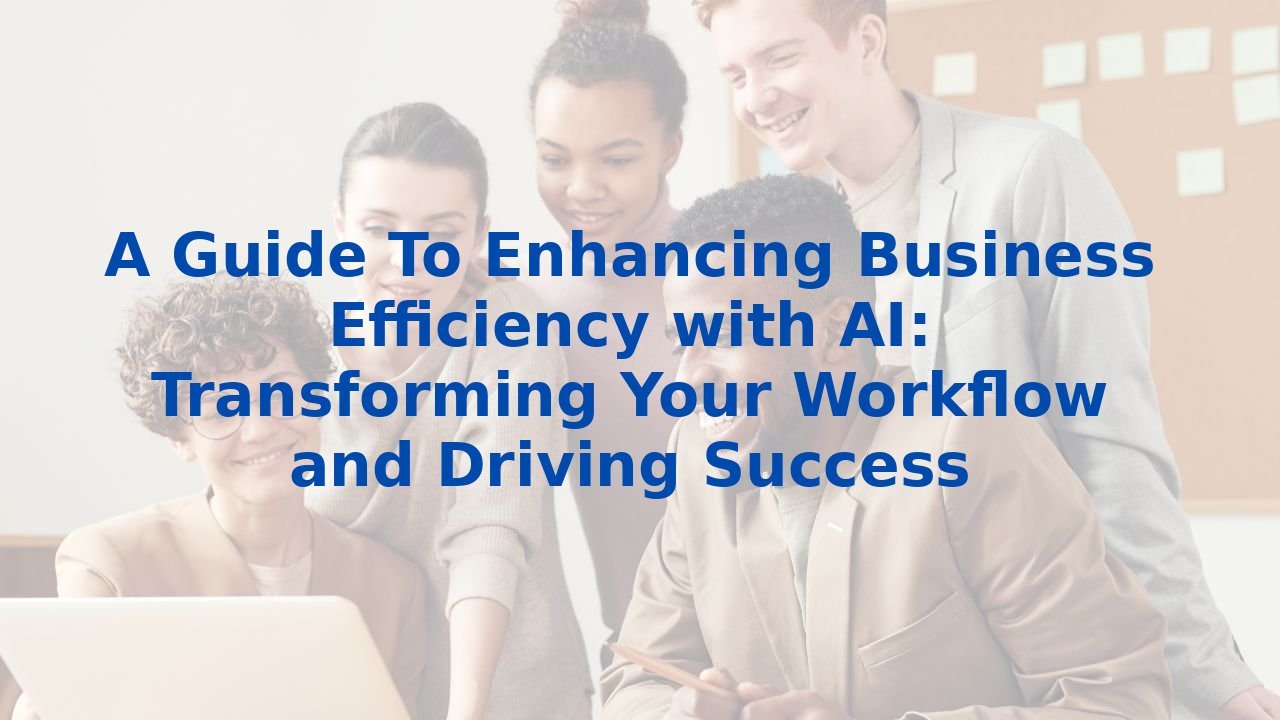A Guide To Enhancing Business Efficiency with AI: Transforming Your Workflow and Driving Success
A Guide To Enhancing Business Efficiency with AI: Transforming Your Workflow and Driving Success
In the contemporary landscape of business, efficiency has emerged as a critical factor for success. As competition ramp up and customer expectations soar, organizations are turning to artificial intelligence (AI) as a game-changer. This transformative technology holds the potential to streamline operations, elevate productivity, and significantly reduce operational costs. In this guide, we'll delve into how AI can refine various business processes, the numerous benefits it offers, and the importance of employee training in realizing AI's full potential.
Understanding AI Process Optimization
At its core, AI process optimization involves the use of AI and machine learning to enhance business process management. This means leveraging data analytics, automating routine tasks, and supporting your team in making informed decisions. The ultimate objective? To minimize errors and maximize productivity while boosting operational efficiency.
Key Applications of AI in Business Processes
1. Data Analysis and Automation
AI excels at organizing and analyzing voluminous datasets to extract meaningful insights. With its lightning-fast processing speed, businesses can uncover trends, forecast outcomes, and diagnose root causes. This capability leads to more strategic decision-making.
On the flip side, AI's automation capabilities allow for the execution of repetitive tasks—think data entry or customer inquiries—freeing up valuable time for employees to concentrate on higher-level strategic endeavors.
2. Process Discovery and Mapping
AI doesn’t just streamline existing processes; it can also identify inefficiencies through process discovery. Utilizing techniques like process mining and natural language processing, AI can reveal bottlenecks that may not be immediately evident through traditional analysis.
Once identified, these inefficiencies can be addressed through process mapping, where AI visuals create actionable blueprints for optimization, ensuring that documentation remains relevant and easy to improve.
3. Decision Support and Risk Prediction
AI's ability to support complex decision-making processes cannot be overstated. By integrating vast amounts of structured and unstructured data, AI can simulate various scenarios, providing invaluable insights for optimal decision-making.
Moreover, the predictive capabilities of AI facilitate risk assessment by analyzing historical data to identify trends that signal potential future issues. As a result, companies can identify and mitigate bottlenecks preemptively, minimizing disruptions.
4. Customer Service and Sales Enhancement
AI is revolutionizing customer interactions. Intelligent chatbots streamline customer service by addressing basic inquiries in real time, ultimately enhancing the customer experience. This leaves customer service teams more time to focus on complex queries that require a human touch.
In the realm of sales, AI analytics embedded within CRM systems allow businesses to predict customer behavior and identify opportunities for upselling, enabling teams to prioritize leads effectively and drive revenue growth.
The Benefits of AI for Business Efficiency
1. Improved Efficiency
One of the most significant advantages of AI is its ability to automate routine workflows. By minimizing the time spent on manual tasks, employees can devote their energies to strategic activities that add real value to the organization.
2. Enhanced Decision-Making
AI’s predictive analytics can transform decision-making processes. The ability to provide data-driven recommendations helps organizations pivot quickly and effectively, fostering better outcomes across the board.
3. Real-Time Monitoring
AI offers a game-changing benefit: real-time monitoring. Using process mining techniques, businesses can swiftly detect issues and seize opportunities, ensuring that operations stay agile and responsive.
4. Cost Reduction
Through automation and superior decision-making, AI reduces overall operational costs. The resulting efficiency not only saves money but also enhances the entire business performance—ultimately driving greater profitability.
The Importance of Employee Training for AI
Despite AI's numerous advantages, its true potential is unlocked only when organizations invest in employee training. Training is not just a nice-to-have; it’s crucial. Here’s why:
1. Understanding AI Capabilities
Employees need a solid grasp of AI's functionalities to integrate them effectively into daily workflows. This understanding goes beyond just grasping what AI can do; it includes knowing its limitations and how to harness AI as a tool that augments human capabilities.
2. Adapting to New Technologies
As AI continues to evolve, training programs should support employees in adapting to new technologies seamlessly. This transition is essential for maintaining smooth operations and fostering innovation.
3. Developing New Skills
With AI handling routine tasks, employees should focus on developing higher-value skills. Training should aim at upskilling workers for more complex responsibilities that require creativity and critical thinking.
4. Enhancing Collaboration
AI can significantly improve collaboration among teams. Training should emphasize the importance of teamwork and how AI can serve as a platform for shared data analysis and collaborative decision-making.
Conclusion
Integrating AI into business processes is no longer a luxury; it’s a necessity for organizations striving for efficiency and success in today’s dynamic business environment. By understanding how AI can optimize workflows, along with the critical need for employee training, businesses can harness AI's true power to improve efficiency and thrive in an ever-evolving market landscape.



